Affiliate disclosure: This post may contain affiliate links. Please see our Privacy Policy.
Preserving eggs without refrigeration is a challenge people have faced for centuries. How do you keep the abundance of spring-laid eggs fresh and usable when your hens stop laying in the winter?
Storing eggs in limewater is a time-tested method for preserving fresh, unwashed eggs without refrigeration. This traditional technique uses food-grade pickling lime to seal the eggshells, keeping them fresh for up to a year or more.
Whether you’re raising your own backyard flock or buying from a local farm, it’s one of the most dependable ways to stretch your spring surplus into the winter baking season, no freezer, fridge, or fancy equipment required.
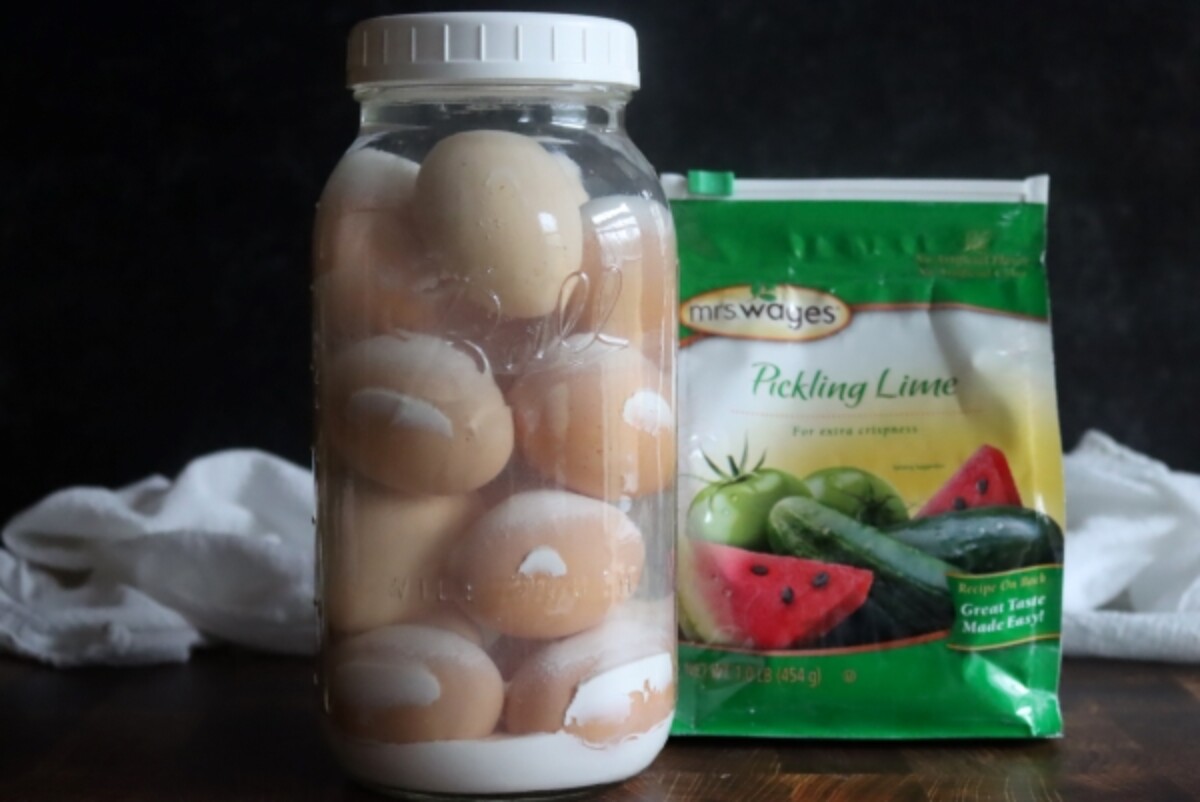
Table of Contents
- Basics of Preserving Eggs
- How Limewater Preservation Works
- Is Limewater the Same as Waterglassing Eggs?
- What You’ll Need
- How to Make Limewater for Egg Storage
- How to Store Eggs in Limewater
- How Long Do Eggs Last in Limewater?
- Does It Change the Taste or Texture?
- Alternative Historical Lime-Based Egg Preservation
- Can I Use Grocery Store Eggs?
- Storing Eggs in Limewater Recipe
- Food Preservation Tutorials
- Frequently Asked Questions
Anyone who keeps chickens knows the struggle: your hens are laying more eggs than you can handle in spring and summer, and then suddenly stop just when the days grow short and you finally feel like baking again. Historically, people had dozens of methods to store eggs for the off-season, but most have drawbacks.
One method stands out for its simplicity, effectiveness, and proven history: storing eggs in a food-safe lime solution made with pickling lime.
I started using limewater preservation because the seasonal rhythm of egg laying never quite matches when I want eggs most. In the spring, I’m buried in eggs but too busy in the garden to bake. By winter, when the days are short and cozy baking season hits, the hens have slowed to a crawl or stopped laying entirely.
We keep our limewater jars on a cool shelf in the basement, right next to the home-canned tomatoes and a crate of root-cellared apples. It’s a satisfying sight in the middle of January—eggs from springtime, still fresh and ready to cook.
Basics of Preserving Eggs
There are literally dozens of ways to preserve eggs.
They stored them in wood ash, wheat bran, and straw, or coated them with butter or lard, or kneaded them into homemade pasta that was hung to dry.
Most of the methods rely on a few simple principles:
- Start with clean, fresh eggs.
- Don’t wash the eggs at all. That removes their natural “bloom” that prevents bacteria from entering through pores in the shell. (Grocery store eggs are washed, and will not keep outside the refrigerator. Do not attempt this, or any other egg preservation technique with grocery store eggs.)
- Keep the eggs cool, but not too cold. An egg is a living thing, and it’ll stay fresh best unwashed and at around 50 degrees (root cellar cool).
- If possible, seal the pores off further to prevent contamination within the egg. Oil, ash, and lime are the most popular choices.
Simply storing fresh, unwashed eggs in a cool environment (around 50 degrees) will buy you a lot of time. We’ve taken our fresh eggs and stored them in the basement dependably for up to 4 months, and occasionally as long as 6 months, no treatment required (so long as they’re not washed).
If you’d like to dependably store eggs for longer than 4 months, like if you’re trying to store an overabundance of spring eggs for the next winter’s baking, you’ll need a bit of help to get them to keep that long.
While many different methods work, most have drawbacks.
Over the years, I’ve experimented with other traditional methods—storing in wood ash gave the eggs a musty flavor, and salt draws out too much moisture. Traditional waterglass (with sodium silicate) worked, but it altered the eggs enough that whites wouldn’t whip and the flavor wasn’t quite right. (Sodium silicate is used for sealing tile these days, so it’s not exactly considered food safe by modern standards either.)
So what does work? Storing eggs in a food-safe lime solution made with pickling lime (calcium hydroxide).
Limewater has been the most reliable method by far, with no off-flavors or texture changes.
By storing eggs in limewater, you can preserve the taste, texture, and function of fresh eggs for 8 to 12 months. Unlike other methods—such as coating in lard, burying in ash, or storing in salt—limewater doesn’t alter the flavor or draw moisture from the eggs. When stored properly, lime-preserved eggs can still fry up, bake, and whip like fresh.
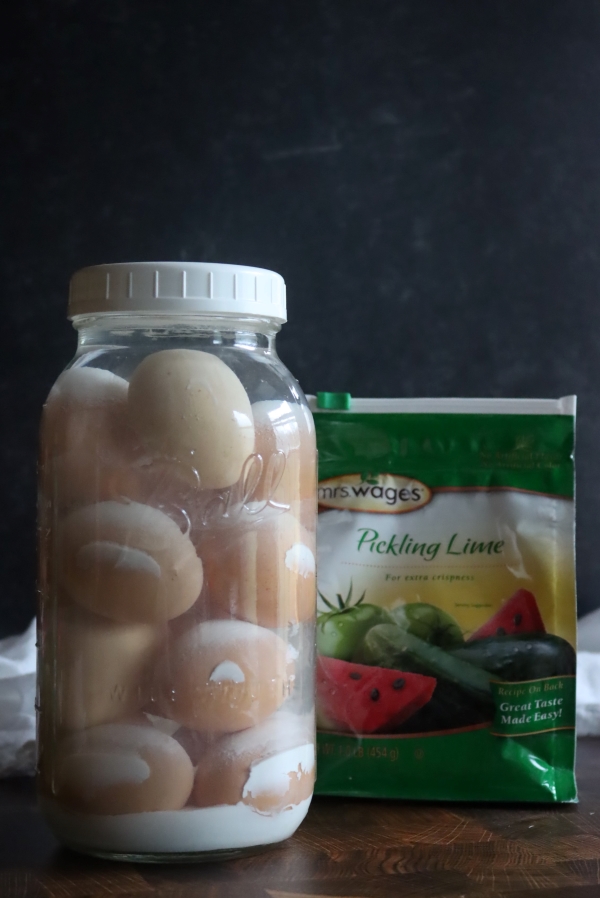
How Limewater Preservation Works
Limewater preservation works by sealing the eggshell’s pores with calcium, preventing air and bacteria from entering and stopping moisture from escaping. The lime used in this process is Food Grade Pickling Lime, also known as calcium hydroxide—a food-grade product that’s often used to firm vegetables during pickling.
Though it’s called “pickling lime,” limewater doesn’t pickle the eggs. The process keeps the eggs in the same state, and once you pull them out of the solution, they can be used just like a fresh egg. They fry up beautifully, and the white still whip to stiff peaks.
It’s called “pickling lime” because it’s used to firm up veggies before pickling, namely Limed Dill Pickles, and old-fashioned watermelon rind pickles. It works the same way to firm up the eggshells and seal them at the same time.
Don’t believe me? Here’s someone cooking with eggs after a full year in lime water:
Is Limewater the Same as Waterglassing Eggs?
These days, many people refer to preserving eggs in limewater as waterglassing, but technically, that’s not quite accurate.
Traditional waterglassing used sodium silicate (often sold as “waterglass”)—a thick, syrupy liquid that was mixed with water to preserve eggs. It was popular in the early 20th century and did an excellent job of preventing spoilage. However, sodium silicate is now more commonly used as a tile sealant or concrete hardener, and it’s no longer considered food-safe for home preservation. Eggs stored in waterglass often developed rubbery whites and wouldn’t whip properly, even if they remained edible.
The method I’m sharing here uses pickling lime (calcium hydroxide), which is still food-safe and easy to find in the canning aisle or online. While it works in a similar way—sealing the eggshell to block air and bacteria—it’s a completely different substance from waterglass.
That said, most people searching online for “how to waterglass eggs” are actually looking for this limewater method. So while it’s not technically waterglassing in the historical sense, this pickling lime method has become the modern go-to for long-term egg storage—and for good reason. It preserves both flavor and texture, and eggs stored this way can still be used for frying, baking, and even whipping.
What You’ll Need
To preserve eggs in limewater, gather the following:
- Fresh, unwashed eggs (laid that day if possible)
- Pickling lime (calcium hydroxide) – food-grade only
- Clean glass jars, ceramic crocks, or food-safe plastic buckets
- Cool storage area (like a basement or root cellar)
Do not use grocery store eggs for this method. Store-bought eggs in the U.S. are washed, which removes the protective bloom and allows bacteria to enter through the porous shell. Only use unwashed eggs from your own flock or a trusted local source.
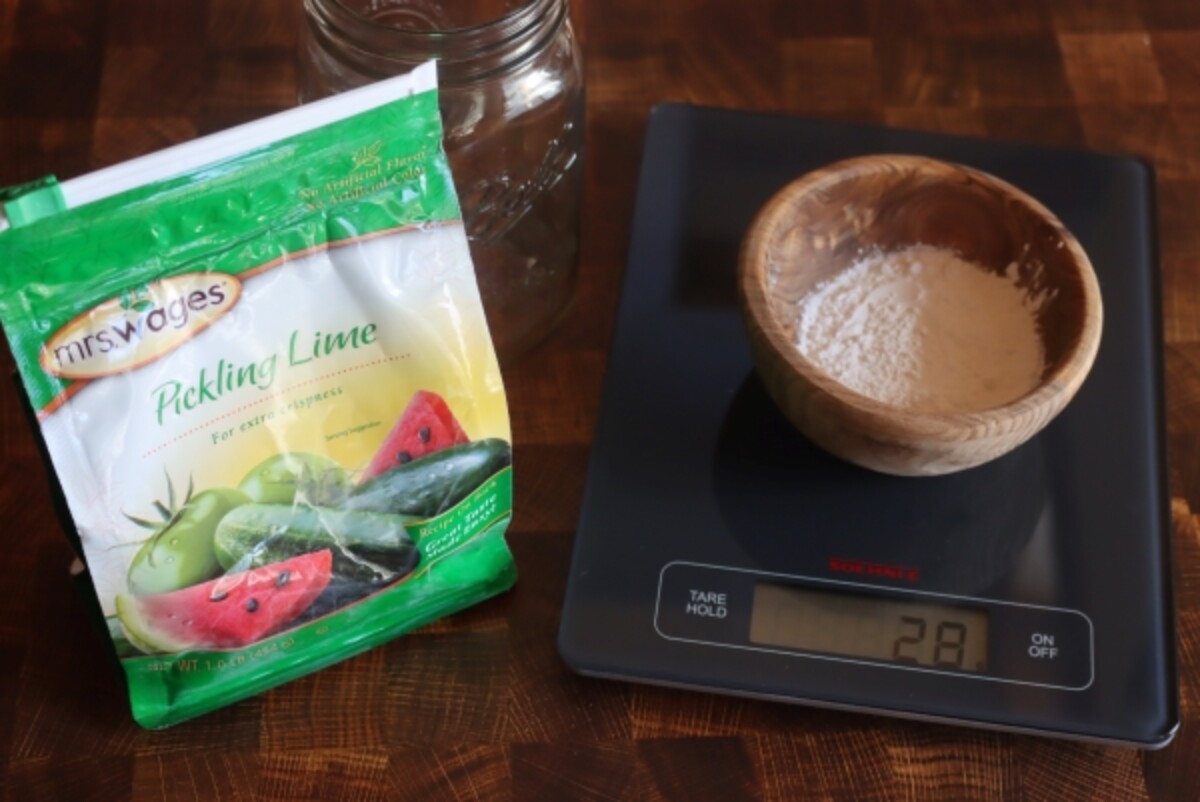
How to Make Limewater for Egg Storage
To make a saturated lime solution:
- Use 1 ounce (28g) of pickling lime per 1 quart (4 cups) of clean, cool water. This is roughly 2 heaping tablespoons of lime powder.
- Mix the lime and water in a jar or bowl. The solution will turn cloudy, and some lime will settle to the bottom—that’s normal and expected.
- This ratio ensures a saturated solution, providing a consistent seal over time without overusing lime.
One quart of solution is typically enough to fill a half-gallon jar once the eggs are added.
Don’t worry if some lime settles at the bottom of the jar—that’s normal. I’ve found that using about one ounce per quart is the sweet spot: enough to create a saturated solution without wasting lime unnecessarily.
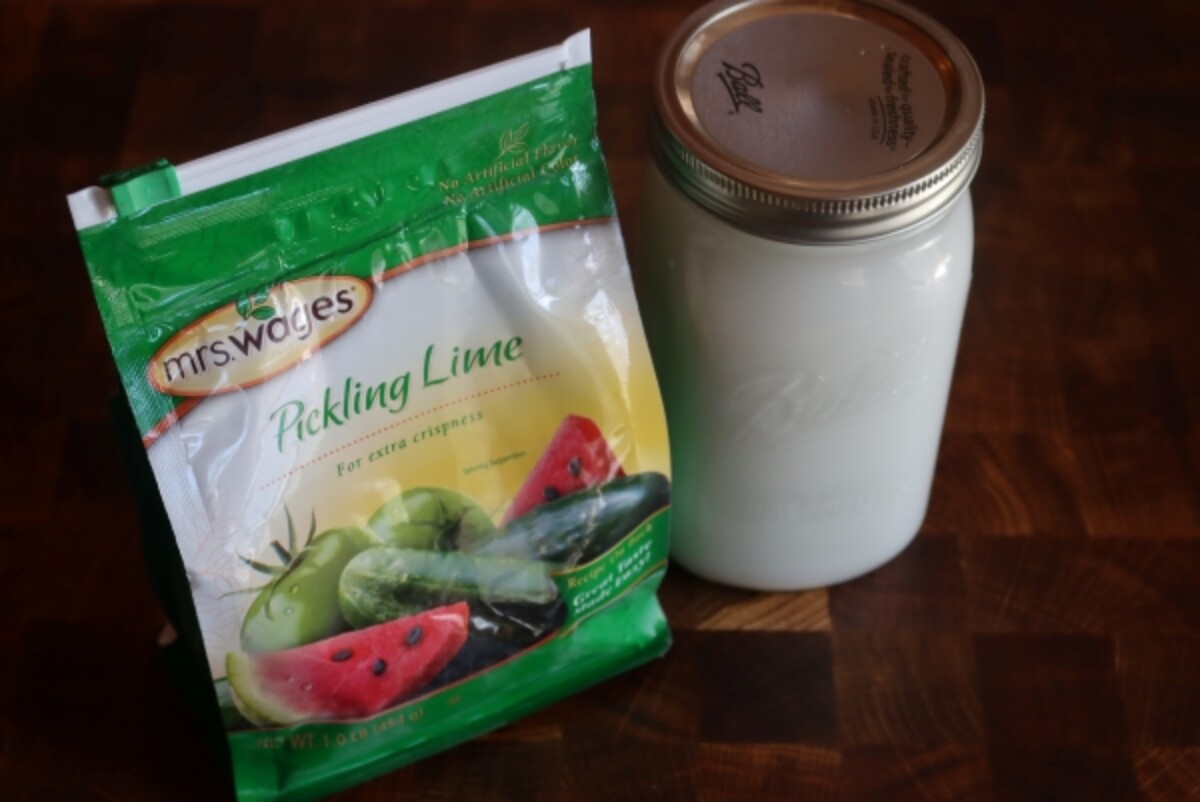
How to Store Eggs in Limewater
- Select only clean, unwashed, fresh eggs. Check for cracks or dirt—any contamination can spoil the whole batch.
- Fill a clean jar or container with eggs, placing them pointy-end down if possible, but orientation doesn’t really matter that much.
- Pour the lime solution over the eggs until they’re completely submerged.
- Cap the jar (or cover with a lid) and store in a cool, dark place—ideally around 50°F.
A half-gallon mason jar will hold roughly 14 to 18 eggs, depending on size. You can also use something like these one-gallon glass jars, which will hold about three dozen eggs.
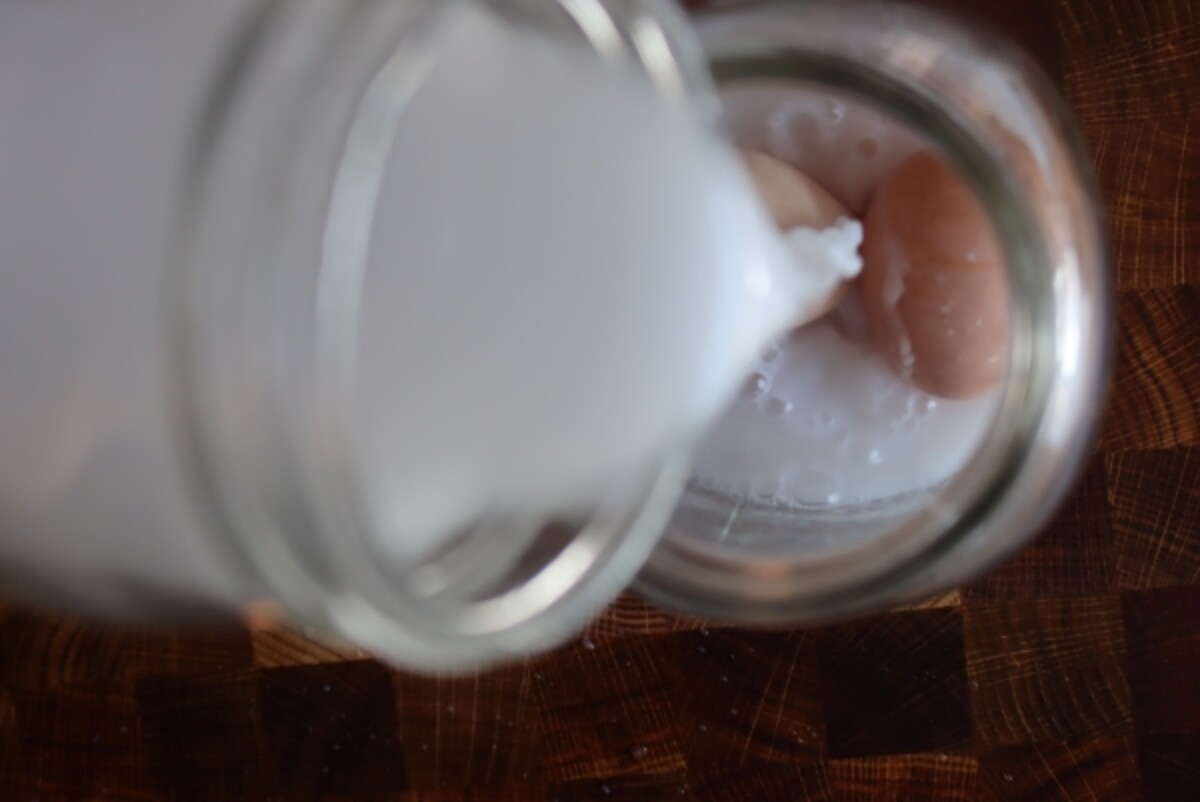
Historically, they would have been stored in wooden barrels or ceramic crocks (like this one that I use to make sauerkraut a gallon at a time).
Alternatively, a food-safe plastic bucket will work if you want to store them in bulk.
We keep our jars of eggs in the basement, right next to my home-canned goods and root-cellared apples.
Once you’re ready to use the eggs, simply remove them from the solution and give them a rinse before cracking. Rinsing ensures that the lime solution doesn’t get into the egg as it’s cracked, which will impact the flavor.
Then, cook with the eggs as you otherwise would.
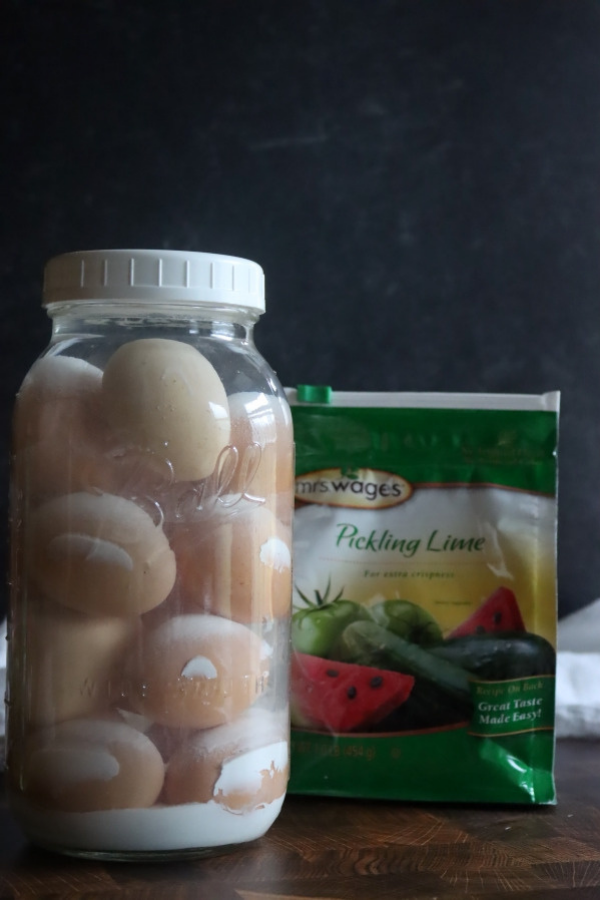
How Long Do Eggs Last in Limewater?
Properly stored, eggs preserved in limewater can last 8 to 12 months or longer. Many homesteaders report success frying, baking, and whipping limewater eggs a full year after preservation. The key is to keep them submerged, cool, and undisturbed.
When you’re ready to use the eggs, rinse each one thoroughly before cracking to avoid introducing lime solution into the egg.
Does It Change the Taste or Texture?
No—when stored correctly, limewater eggs retain their taste and texture remarkably well. They fry like fresh eggs, bake beautifully, and even whip to stiff peaks for meringue and angel food cake. Unlike waterglassed eggs (preserved in sodium silicate), limewater eggs don’t soften or change structurally over time.
Alternative Historical Lime-Based Egg Preservation
I found a reference to preserving eggs in lime water in the book from the 1950s called “Stocking Up.” It contains all manner of historical food preservation information and has a whole chapter on eggs.
It notes that most people “found some way to clog up the pores of the eggshells so that moisture would not escape and air could not enter. Eggs were rubbed with grease, zinc, or boric ointment, or submerged in a solution of lime, salt, cream of tartar, and water.”
While stocking up does not give proportions, I found a reference on a historical food and cookery site that suggest this method:
“To one pint of slacked lime, add one pint of salt, two ounces of cream of tartar, and four gallons of water. Boil all together for ten minutes. Skim, and when cold, pour it over the eggs. Lay a light saucer upon the top to keep them underwater, and keep in a cool place. Renew the lime water every three weeks.”
So for that method, you’d need:
- 1 pint slaked lime
- 1 pint salt
- 2 oz cream of tartar
- 4 gallons of water
The downside of this mixed solution is that the salt permeates the shells and will flavor the eggs, so I’d suggest going with a simple lime solution without salt.
Can I Use Grocery Store Eggs?
Unfortunately, no. U.S. grocery store eggs are washed and sanitized, removing the natural protective bloom on the shell. This makes them unsuitable for room-temperature storage or limewater preservation. Use only unwashed, farm-fresh eggs for this method—ideally from your own chickens or a trusted local farm.
In many other countries, eggs are sold unwashed and unrefrigerated, which makes preservation easier. But in the U.S., safe limewater preservation requires unwashed eggs only.
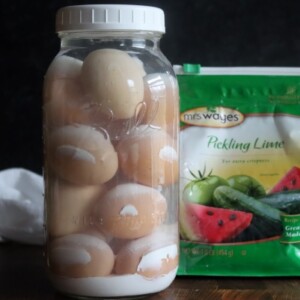
Storing Eggs in Limewater
Equipment
- Half Gallon Mason Jar
Ingredients
- 16 large eggs, fresh, unwashed eggs (collected the same day)
- 1 quart cool water
- 1 ounce food grade pickling lime, 28 g or ~2 heaping tablespoons, calcium hydroxide
Instructions
- In a quart mason jar or mixing bowl, combine 1 quart of cool water with 1 ounce of pickling lime. Stir or shake to create a saturated lime solution—it will appear milky, and some lime will settle to the bottom (that’s normal).
- Gently place 16 clean, unwashed eggs into a clean half-gallon glass jar.
- Pour the limewater solution over the eggs until they’re fully submerged. Cap the jar and store in a cool, dark place.
Notes
Food Preservation Tutorials
Looking for more historical food preservation tutorials?
- Salt-Cured Duck Breast
- Preserving Cheese in Wood Ash
- Salt Cured Egg Yolks
- 18th Century Farmhouse Cheddar
- How to Preserve a Whole Pig Without Refrigeration
Frequently Asked Questions
No. Traditional waterglass refers to sodium silicate, while limewater uses pickling lime (calcium hydroxide). Though both methods preserve eggs by sealing the shell, pickling lime is food-safe and doesn’t affect the flavor or texture of the eggs. Today, most people searching for “waterglassing eggs” are actually referring to the limewater method.
No. Grocery store eggs in the U.S. are washed, which removes the natural protective coating (bloom) and opens the shell’s pores. This makes them unsafe for room-temperature or limewater storage. Only use unwashed, farm-fresh eggs for this method.
Properly stored eggs in limewater can last 8 to 12 months or longer. The key is to keep them cool, fully submerged, and in a clean, sealed container.
No. Eggs stored in limewater retain their original flavor and texture when handled properly. They can be fried, scrambled, baked, or even whipped like fresh eggs.
No refrigeration is needed. Store the jars in a cool, dark place like a basement, pantry, or root cellar. Temperatures around 50°F are ideal.
Glass jars, ceramic crocks, or food-safe plastic buckets all work. A half-gallon jar holds about 14–18 eggs, while a one-gallon jar holds roughly three dozen.
It may give the egg a bitter or chalky taste. Always rinse the egg thoroughly before cracking to avoid introducing lime solution into the egg.
No. Always make a fresh batch of limewater for each new batch of eggs to avoid contamination and ensure a fully saturated solution.
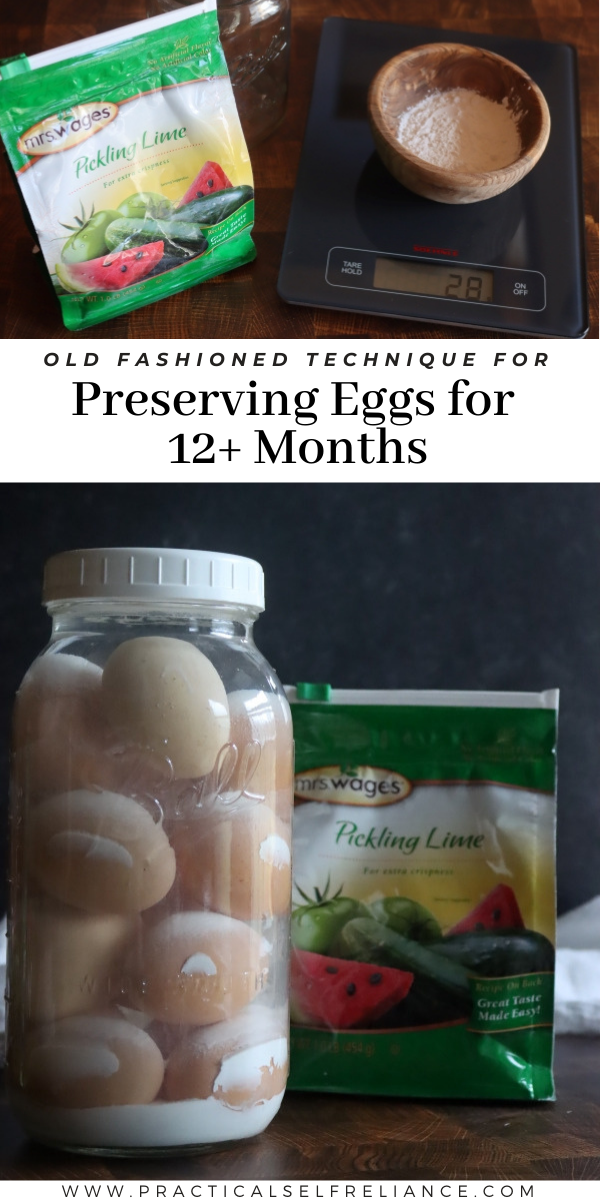
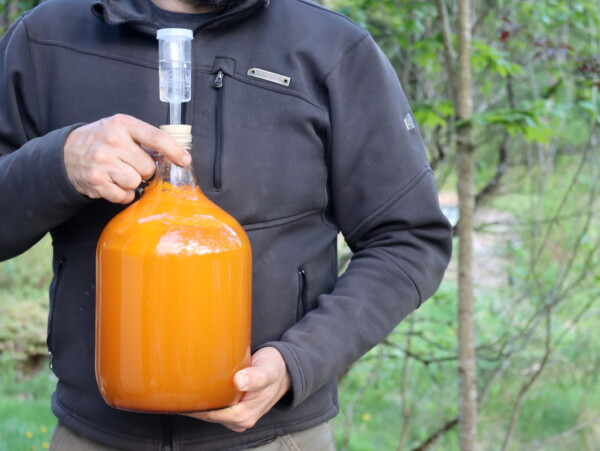
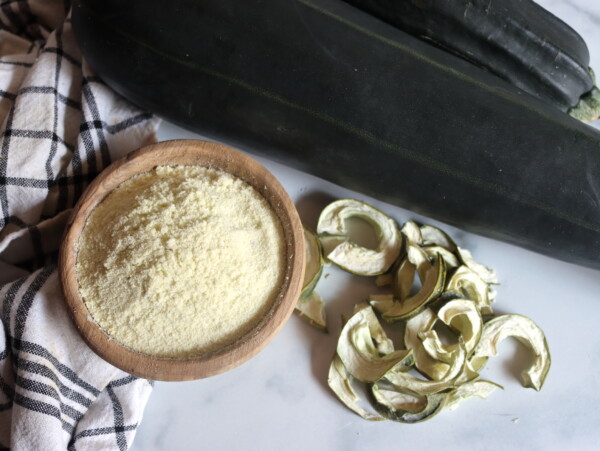
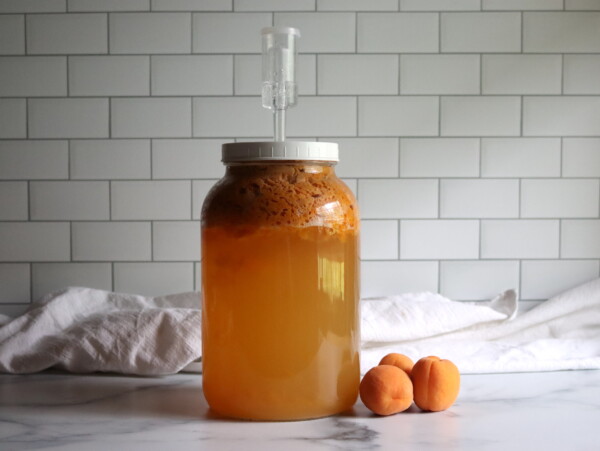
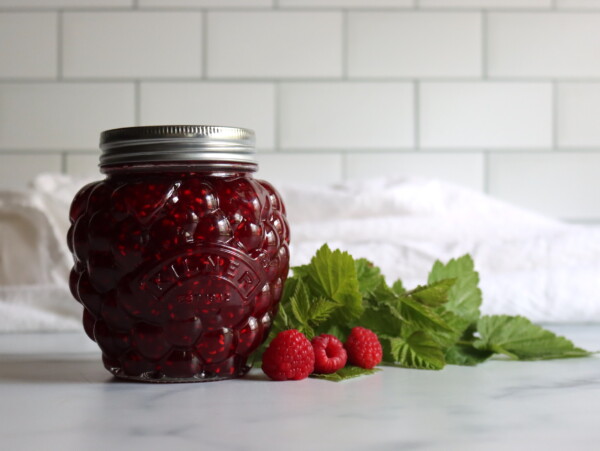










I just found a quart of lime preserved eggs created on May, 22, 2024 from Ashley’s recipe. 19 months ago. After cracking two eggs into a bowl, they appeared normal except for the whites being a bit runnier than fresh eggs. They smelled and looked well enough to give them a try. To my surprise, my scrambled eggs tasted as well as if they were canned yesterday. I would not recommend leaving them for 19 months before testing them but in this one case, I the eggs were preserved in an excellent manner. Thank you Ashley for sharing this recipe with all of us looking for ways of becoming more self-sufficient.
Perfect! I’m so glad your eggs turned out. That’s been my experience too, they keep just fine. The whites are maybe a bit runnier, but they’re still perfectly preserved.
Can I add fresh eggs to the solution the next day? I only have eight chickens It will take two days to fill the jar.
Yes. You can keep adding eggs to the solution until your jar is full.
Can I make a batch of the solution and then add eggs as I get them? I only have 4 chickens so it would toke 4 days to get enough for a batch. Also most of my eggs have some small thing on them whether poop or feathers or whatever. Can I brush this off and still preserve with this method? Someone suggested using sandpaper (very lightly). What are your thoughts on this? Thanks.
Yes, you can add to the jar for a few days, that’s fine. Just make sure everything is covered with the solution. You can brush off debris from the eggs, but don’t use water or sandpaper to remove it. If it won’t come off with a quick wipe or your hand or a dry towel, they’re not clean enough to preserve in this way.
One question I have never found the answer to is, can I add more solution to the jar? After several months, I noticed that it seems to be evaporating.
Yes, you can add more to keep the jars full. It helps to tightly cap the jars though, to prevent evaporation.
I was gifted fresh eggs, non washed but each egg is stamped with eye farm’s logo, can these be limed?
Eggs should only be limed when they are collected fresh the same day. I’m not sure about the stamp. In the future I would see if you can request it not to be stamped.
Thank you for replying. I will ask the stamp not be applied…
Sara
You’re welcome.
Im curious if the water source makes any difference. We are on a well with hard water. And i wonder a out people with city water.
That’s a good question. I’m not sure if anyone has done the research on this. Let us know if you’re able to find out. I would say just put a few eggs in and give it a try.
Are you able to rinse off the preserved eggs and then boil them for egg salad?
Yes, they can be used the same way as any fresh egg.
For this process and long term storage, does the jar need to be air tight? I have some great 1/2 gallon wide mouth jars with metal lids but they do not have a liner and will leak water if turned over so I know there are not air tight. Am wondering if they would work or cause problems for long term storage.
It is not necessary for them to be completely air tight.
Is it normal after like 6 months+ my eggs were great to the taste. I left them in a refrigerator due to warm temps in So. Calif. When I went to fry/ break the egg, the egg white was on the more than runny side. Is this normal?
Can you tell me did you use fresh eggs that were collected that day when you initially put them in the limewater?
I read your comment about the eggs being same day fresh and unwashed. I am looking to use 1/2 or 1 gallon jars and don’t get that many eggs in a single day. Can I formulate the limewater and add eggs each day until the jar is full, then store it? If not, would storing them a day or two in a cool place then putting them all in a jar, some a couple days old, ruin the whole batch?
Thanks for the great article.
Johnny
Great question! I would just add the eggs into the jar as you get them and they will be just fine.
Hi there
We recently opened our first batch of preserved eggs. They are 9 months old. There was no foul smell but when cracked open, the yolks just broke open. The egg was entirely runny. We made a scrambled egg out of it which tasted ok, although it lacked that strong protein flavor of a fresh egg, tasted more like store bought. Just wondering if we possibly did something wrong. We’ve cracked open several so far and each one the yolk is broken and runny. I understand the whites are typically runny so I’m curious about my yolks. There has not been one yolk that has held its shape. I don’t have a completely cool space to store them so they are stored in a space that averaged 60-65° temps. We collected and preserved same day, clean eggs only.
It sounds like you did everything properly. It’s probably just the warmer temperatures.
When we farmed I froze extra eggs…any and every kind, in margarine tubs or plastic containers. One, two or three to a container, marked the lid so I could get the right size for baking, egg salad, etc. Worked every time, no different taste. Cooked well.
I scramble two eggs and then put them in 6oz yogurt cups then freeze them. once they’re frozen I spin each cup in hot water for a few seconds til they release then put them in a zip lock bag. If you need an odd number of eggs you can just cut one in half with a big knife.
I scramble two eggs and then put them in 6 oz. yogurt cups then freeze them. There’s probably room in the cup for three eggs but I mostly use two. Once they’re frozen I spin each cup in a bowl of hot water for a few seconds, just long enough to release them from the cup then put them all in a zip lock bag and back into the freezer. I can thaw them in the microwave for about 20 sec. If you need an odd number of eggs you can just cut one in half with a big knife (carefully).
Greetings from southern Vermont! I read your article and through all of the comments, put away dozens of eggs through the spring and summer. Today we ran out of fresh eggs and brought up our first 8 qt. Cambro container. Three eggs had cracked, releasing the eggs into the solution. (Initially, all eggs had been fresh, clean and no visible cracks) I seem to remember reading that if that happened, we’d need to throw out the batch—but I can’t find that info again. We cracked one and it smelled fine. Do you think they’re safe? Thank you for all you do!
I would definitely be leary of using them if there were cracked eggs in there, but it’s also not hard to tell if an egg is bad or not. What did you decide to do?
I just had the same thing happen. Used clean, fresh eggs with no visible cracks. The jar was moved. About a month later the water looks cloudy so I turned the jar to look and I can see one thinly cracked egg with the yolk filtering out. I really hate to throw away the entire batch. It was the last jar I did. I’m thinking I should use that jar first. Test out a few before I pitch it entirely. What are your thoughts on this? All other eggs in that jar look fine. There’s about 33-36 eggs in the jar.
Do these truly need to be eggs picked the same day? Then this is only useful for people with chickens. I am trying to deal with extra (unwashed) eggs from my CSA–probably a week or so old when I get them.
I’m sorry but the recommendation is for eggs that are gathered that day for limewater preservation. You can look into other methods such as freezing or freeze drying.
I have glassed eggs from between 1-3 days and they have been fine. I would even venture to try 4 or 5 , but thats me.
I’ve stored unwashed eggs from my Amish neighbors that have sat for a couple weeks before I had enough to fill the bucket. They were used through the winter up to 6 months until we could get fresh eggs again. The eggs were fine but over time the yolk softens but the flavor and smell were the same.
Can Chemstar Type S Organic Hydrated Lime be used as a pickling lime? Thank you
Pickling lime and hydrated lime should be the same.
Any idea how to dispose of previously used lime solution? I had great success doing this with my eggs last year, and I need to start again (so many eggs!) but I haven’t found any advice on how to dispose of the solution properly. Thanks!
There is no special way to dispose of the solution. You can simply pour it down the drain when you are finished with it.
Does it matter if the eggs are fertilized? We keep roosters at all times so ours would only be fertilized eggs. Thanks!!
Nope, doesn’t matter at all as long as they are fresh.